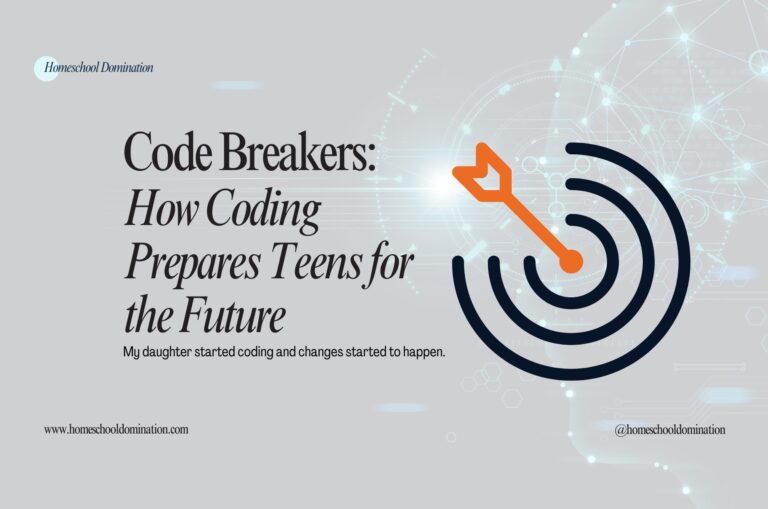How to Overcome the Fear of Homeschooling Your Kids
My mom teaches 5th and 6th grade Science at a public school. She worried about me failing in Science, especially when I moved to a private school for 5th grade and it happened.
Having been in public school, I didn’t study much, especially Science and History. But I do love Math. I used to be really hard on myself about making mistakes, so I always aimed for a perfect score in Math. Besides Math, I found the other subjects easy. I just had to listen and I would get good grades, enough to keep me in the top five of my class. But that didn’t last long.
I started at a new private school, expecting it to be like my old public school. I didn’t realize that going to a private school meant a whole new way of doing things. We have to buy a textbook and read it every single night, study it, and memorize it. I never knew it would be like this. I thought I was one of the smartest in my class, but now I feel like I’m not. On top of that, my new classmates have been in this private school routine since they were in kindergarten!
Then comes my first grading test in Science, I got 40/80.
“That’s a good grade,” I thought.

Well, not to my mom. She was in complete distress. She decided to sit down with me one night and taught me to read my text book. Who knew there is a thing called “textbook?” She taught me to highlight the important concepts. We went through my test paper, and taught me how to find those in my textbook. In other words, she taught me the pattern on how to source my textbook to prepare for quizzes and tests. She did those session with me regularly until I was doing it on my own.
Did I tell you my mom isn’t very gentle? She gets angry easily and loses patience when she sees I’m not paying attention. I wasn’t the most responsible child. In fact, I was the laziest, most distracted, and most disorganized child she had. You can imagine how our evening study sessions went. I can see that sometimes she would lose her patience with me.
Looking back, I may have shown her that I didn’t care about her teaching. But you know what? Even now, the Science concepts I remember the most are the ones I learned with my mom, despite her impatience. I wasn’t great at expressing myself, but those nights of learning with her are some of my fondest memories. She not only helped me understand the concepts, but also gave me the confidence and discipline to navigate the world outside of home.
It was a big change for me. I didn’t end up as one of the top five students in my private school, but I definitely improved my learning skills. These skills helped me succeed in another private school and graduate with honors in both high school and university.
Those special times with my mom inspired me to homeschool my kids because I saw how it can positively impact children when parents are the ones teaching them.
The fear of teaching your own kids is just a perception. You would think that they will not listen to you, but truth is they would like you to be their teacher. They just don’t like to give you too much credit.
Rejoice! Here are some ways on how to overcome the fear of homeschooling your kids.
Learn with Your Kids (even the hard concepts)
If your child has always been in daycare or regular school and has been independent in completing assignments and projects, their understanding of learning is that “they learn with others.” This is the perfect time to change that perspective and learn with them. It doesn’t have to be formal learning at this point; it can be as simple as doing a puzzle, planting a garden, learning a new board game, discovering card tricks, or anything else that interests your kids. It should be something new for both of you. Remember that during this activity, you are not teaching them; you are learning with them. So enjoy it like a real learner. Allow both them and yourself to make mistakes.
While teaching your kids, pay attention to how they learn best. Take the time to listen to them and understand what methods they prefer for learning. Do they learn best by reading instructions, by doing things themselves, by watching videos, or by teaching others? Understanding this will help you support their learning in the best way possible.
Apply what you have observed in your academic learning.
My favorite subject to learn with my kid is Math. Some concepts are new to me, while others are a refresher. So both my child and I are learning together. Sometimes, we both don’t know the answer. But when we figure it out, it feels like we’ve discovered a treasure. Don’t be afraid to admit you don’t know, then learn together. It will be the best learning experience.
If you have a lesson plan or teacher guide from a curriculum, it’s not meant for you to read word for word and sound like a robot. It should serve as a guide. The best approach is to study the lesson yourself, and express it like a normal conversation.
Involve them in Decision-Making
Kids nowadays enjoy being included. They don’t want to feel alone, but their curiosity makes them want to be part of things. Let them have a say in some decisions you need to make.
I knew an older person who shared a story about shopping for shoes with her kids. She would pick three pairs of shoes from all the options, and then let her child choose from those three pairs. It’s a nice idea, isn’t it? Your child can choose a pair to buy from the three pairs that you have already selected.
Apply the same concept when choosing curriculum, a field trip, or games, even as simple as school supplies. The key is to have short list of what is available in the market to make sure it fits your criteria of quality, then have them decide the last mile.
Develop the love of Learning in Your Home
Make your home a great place for learning. It can feel like going on a field trip every day without even leaving your house. Get into the habit of learning with things you have at home.
One important thing about learning is being creative. Kids have time every day to be creative and make things. We have books, posters, and materials to help them learn and create. They use things like motors, batteries, and recycled materials. They might even make a car that moves with wheels.
Other learning activities like playing musical instruments, taking care of pets, tending to an indoor garden, building block structures, and using safe power tools can be easily done at home. Encourage yourself and your kids to explore the house and learn. I don’t mind cleaning the house frequently because I believe that the more untidy it is, the more learning is taking place.
There is so much to learn. The only limit is where your child’s imagination can take them. Once you develop the habit of learning, both your mindset and your child’s mindset will shift to a love of learning. You will become more mindful of the toys you buy, ensuring that they enhance learning.
We transformed part of our garage into a plant nursery. Despite it being winter, we used a heating pad and planted seeds. We labeled the seeds, check on them every day, and watch them grow.
Shutdown the television and the internet during this time. Have them explore throughout your home with things they can touch, smell, taste, see and feel. Allow their curiosity to take over, and learning will take place on its own.
Oh, just make sure they don’t burn your house!
Encourage Group Activities
We have a big table that we call our collaboration table. It’s where our family gathers to work together. We might work on a summer journal and add the things we found outside, or look at a flower or a root system. We might learn a new board game or play one we already know. We might study a part of the Bible or solve a difficult math problem. Sometimes we just eat a lot of french fries and compare different sauces. The big table brings us all together to collaborate.
While we do all these things, take time to observe them. It’s interesting to see each of your child learn.
Designate a place where you can work together.. So that when they get to that table, it signals collaboration. Learning and you teaching begins without formalities.
Once you have developed the habit of learning with your kids, and give them room to be part of the learning, then teaching them will become very natural for you and your kids. You will almost forget you are teaching. Your kids will almost forget they are learning.





